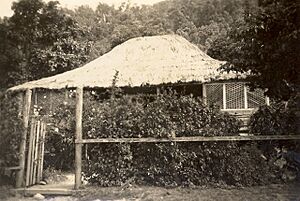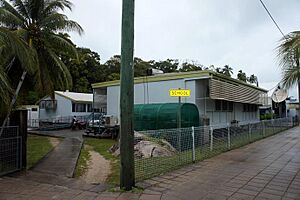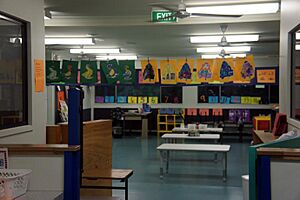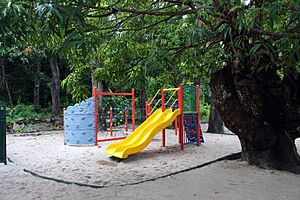Yam Island facts for kids
|
Native name:
Yama; Iama
Nickname: Turtle-backed Island
|
|
|---|---|
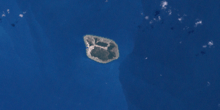
Landsat image of Yam Island
|
|
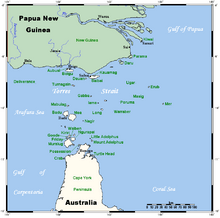
A map of the Torres Strait Islands showing Yam Island in the central waters of Torres Strait
|
|
| Geography | |
| Location | Tancred Passage, Northern Australia |
| Coordinates | 9°54′05″S 142°46′30″E / 9.9014°S 142.7750°E |
| Archipelago | Bourke Isles group, Torres Strait Islands |
| Adjacent bodies of water | Torres Strait |
| Total islands | 1 |
| Area | 2 km2 (0.77 sq mi) |
| Administration | |
|
Australia
|
|
| State | Queensland |
| Local government area | Torres Strait Island Region |
| Demographics | |
| Ethnic groups | Torres Strait Islanders |
| Yam Island Queensland |
|||||||||||||||
|---|---|---|---|---|---|---|---|---|---|---|---|---|---|---|---|
| Postcode(s) | 4875 | ||||||||||||||
| Area | 1.9 km2 (0.7 sq mi) | ||||||||||||||
| Time zone | AEST (UTC+10:00) | ||||||||||||||
| LGA(s) | Torres Strait Island Region | ||||||||||||||
| State electorate(s) | Cook | ||||||||||||||
| Federal Division(s) | Leichhardt | ||||||||||||||
|
|||||||||||||||
Yam Island, also known as Yama or Iama in the local language, is a small island in Australia. People sometimes call it Turtle-backed Island. It is part of the Torres Strait Islands in Queensland, Australia.
The island is about 100 kilometers northeast of Thursday Island. It covers an area of about 2 square kilometers. The main town, also called Yam Island, is on the northwest coast. In 2021, about 275 people lived on Iama Island.
The language spoken by the local people is Kulkalgau Ya. This language is a dialect of Kalaw Lagaw Ya, which is spoken in the Western-Central Torres Strait.
Contents
Island Geography
Yam Island is a small but important part of the Torres Strait. The main town is located on the northwest side of the island. It is a central point for the community.
The island also has its own airport. Yam Island Airport is in the northern part of the island. This airport helps connect the island to other places.
A Look at Yam Island's Past
Yam Island has a long and interesting history. Legends say that people from Papua, a nearby country, settled on Yam Island a very long time ago. They then spread out to other islands in the Torres Strait.
Early Settlers and Their Journeys
Stories tell of people from Papua settling on Parema, then moving to Yam Island. From Yam, they traveled to different island groups. Some went west to Moa and Mabuiag. Others went north to Saibai, Boigu, and Dauan. These early settlements might have happened around 2800 years ago.
Later, people from Papua called the Meriam moved to other islands like Mer, Erub, and Ugar. They took over much of the land there. The Western-Central Islanders called these new people the Nog Le, meaning Common People. They called themselves the Gam Le, or Body People, because they were often stronger.
Languages and Culture
The languages spoken today show the mix of cultures. The Western-Central language has parts from Australian, Austronesian, and Papuan languages. The Eastern language is mostly Papuan, but also has Australian and Austronesian words.
Connections with Daru Island
An old Papuan story says that people from Yam Island first settled on an island called Daru. This was before the Kiwai people took over parts of the Fly Delta. The people of Yam Island had strong trading and family ties with the Papuans.
When the Kiwai people started to take over land, some Yam people escaped. Some went to the mainland, and others went to Saibai, Boigu, and Dauan. Most Yam people wanted to keep their own identity. So, they moved far south in the Torres Strait. They settled on Moa, Muri, and the Muralag group of islands.
A small group of Yam people stayed on Daru. They became part of the Daru Kiwai community. The Yam people who moved to the Muralag group called themselves the Kauralaigalai, or Kaurareg. They called themselves ‘Islanders’ to show they were different from the ‘Mainlanders of Papua’ and the ‘Aborigines of Australia’.
Today, the Kaiwaligal (Kaurareg) and the Kulkalgal (Central Islanders) are still close. They see themselves as related. The Kulkagal (Yam people and others) have also kept their old ties with the Trans-Fly people and now with the Kiwai.
European Visitors and Changes
The first Europeans to see Yam Island were from a Spanish trip in 1606. They called it Isla de Caribes because of the tall warriors they met there. In 1792, William Bligh visited the island. He named a nearby island 'Warrior Island' after an attack.
The London Missionary Society set up a station on Yam Island. This helped a permanent village grow around the mission. Many men from Yam Island started working on pearling boats. There were pearling stations nearby in the 1870s.
People from other Pacific Islands who worked at a pearling station later settled on Yam. During World War II, many Yam men joined the army. They were part of the Torres Strait Light Infantry Battalion.
For a long time, Yam Island was quite separate from the rest of the world. An airstrip was built in 1974. The island got telephone service in 1980. Yam Island has produced important leaders for the Torres Strait. These include Getano Lui (Snr) and Getano Lui (Jnr).
Recording Island Stories
In the 1950s, 60s, and early 70s, Margaret Lawrie visited the Torres Strait often. She became friends with many Islanders. They asked her to write down their stories and family histories.
Margaret researched the culture of the Torres Strait. She collected stories, recordings, photos, and artworks. This work led to her books, Myths and Legends of Torres Strait (1970) and Tales from Torres Strait (1972). This collection was added to the UNESCO Memory of the World Register in 2008.
Yam Island State School opened on January 29, 1985. In 2007, it became the Yam Island Campus of the Tagai State College. This college has 17 campuses across the Torres Strait.
Population Information
The table below shows how the population of Yam Island has changed over the years.
| Census Year | Population | Notes |
|---|---|---|
| 2001 census | 275 | |
| 2016 census | 319 | |
| 2021 census | 275 |
Learning and Education
Yam Island Campus is a primary school for children from Early Childhood to Year 6. It is part of Tagai State College. The school is located on Kebisu Street.
Community Facilities
The Torres Strait Island Regional Council runs the Dawita Cultural Centre. This center is on Church Road. It opened on July 26, 2007.
The center includes an Indigenous Knowledge Centre (IKC). The IKC helps the community keep their culture alive. People use it to share their language, art, songs, and dances. Many projects have been done through the IKC to collect stories and share knowledge.
Yam Island also has a State Emergency Service. This service helps the community during emergencies. It operates from Kebisu Street.
Margaret Lawrie Collection
The State Library of Queensland has a special collection. It is called the Margaret Lawrie Collection of Torres Strait Islander material. This collection was added to the UNESCO Memory of the World Register in 2008.
The collection has materials gathered by Margaret Lawrie. She collected them between 1964 and 1973. They show the culture of the Torres Strait Islander people.
The collection includes family trees, children's games, maps, music, and photos. It also has sketches, stories, and words from different Torres Strait languages. These include languages from Badu, Mabuiag, Thursday Island, and Yam Island.
Famous People from Yam Island
Some notable people have come from or lived on Yam Island. They include:
- Margaret Lawrie (1917–2003) - A writer and collector of Torres Strait Islander stories.
- Ethel May Eliza Zahel (1877–1951) - A teacher and public servant.
- Maino Kebisu - A leader, statesman, and storyteller from the island.



